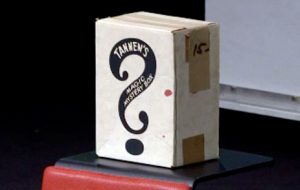Now, I have to admit, I never actually watched the show Lost. I’d tune in for a few seconds now and then to confirm that I was in fact “lost.” Relieved to find that I was easily keeping pace with regular viewers who were equally lost, I would move on. Likewise, I did tune in for a few seconds to the final episode, just to confirm that all was still lost.
But rather than being frustrated, as so many fans were, at the failure of any number of dei ex machina to satisfactorily resolve the loose threads that accumulated wildly over the series, it struck me that this was exactly what was promised: “Lostness.” After all, the show was not called “Lost and Found.” Imagine, if you will, such a show’s premise: that those things we seemed to value, left on their own, ultimately resemble nothing so much as junk, floating in a bureaucratic limbo.
But I digress.
Ultimately, the illusion of Lost was to think that the promise of an ever receding disclosure of the secret was ever fulfillable as such.
Is this a failure? Perhaps, but perhaps it expresses the deep paradox of secrets. They are compelling precisely to the extent to which they are not disclosed. But if a secret is never disclosed, then it also fails to be compelling. Thus secrets, to work, must continue to leak. As Deleuze and Guattari put it in A Thousand Plateaus:
In short, the secret, defined as a content that has hidden its form in favor of a simple container, is inseparable from two movements that can accidentally interrupt its course or betray it, but are nonetheless an essential part of it: something must ooze from the box, something will be perceived throught the box or in the half-opened box.
What we saw in Lost, however, was not a secret per se, but a relentless drive towards the infinite form of secrecy itself. But such a move has a cost. The specific content now becomes impossible to manage. The secret becomes both all pervasive and banal at the same time. Deleuze and Guattari thus poke fun at the Freudian secret key:
The news travels fast that the secret of men is nothing, in truth nothing at all. Oedipus, the phallus, castration, “the splinter in the flesh”—that was the secret? It is enough to make women, children, lunatics, and molecules laugh.
Was this not the hopeless plight of the conclusion of Lost? What could possible measure up to the suspense?
Ernesto Laclau, in On Populist Reason, argues that this “emptiness of the signifier”—the way in which the rallying cry of the people tends to lack any specific meaning—is not a sign of the ignorance of the mass movements, but the very thing that allows them to work, to rally.
And lest you thought we were lost, here is my point: does not “Education” serve as an “empty signifier”? Something that anyone can get behind, precisely because its actual content eludes us.
Like the Magic Mystery Box that J. J. Abrams’ shows us in the video above, it promises a value in excess of its retail price. And like the box, it is best left closed, lest we are disappointed by the cheap cardboard tricks it may contain.
But don’t we know this? Haven’t we been suckered before? We have to muster all of the tricks of magic and illusion, deferral and displacement, to keep it going. This, perhaps more accurately, is the real education.
Ira Shor, in Critical Teaching and Everyday Life, talks of “cooling out.” Community colleges, in order to fill their classes, promise Education, mostly in the guise of upward mobility. The moon in a box. Of course, it can’t be delivered as such, and thus begins the long process of cooling out, in which students are brought back from their original desires. Rather than being a failing of the school, it turns out to be the student’s own self that impedes their progress, and which should cause them to recalibrate their expectations.
Of course, by then the students already know the game. They learned it in school. The lament of high school teachers: everyone wants to be a basketball star or a rapper. How can I burst their bubble so they can take their education seriously?
Indeed, the creators of Lost had their own balancing act of expectations to manage. How does one continue to maintain and increase suspense, knowing there is no way to ever open the box? Relax, they told everyone. Its only a show. Don’t take it so seriously. Just good fun. Time to get on with your life.
And above all, don’t think about what it was too much…
